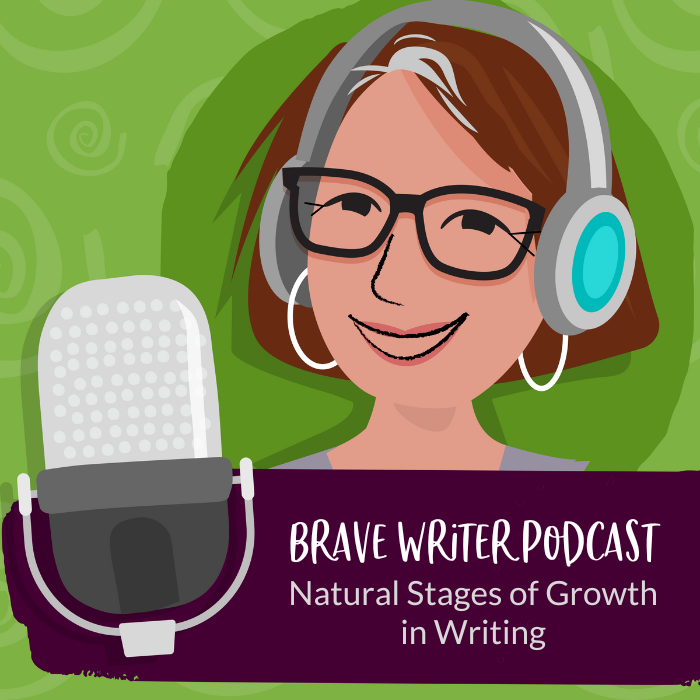Podcast: Natural Stages of Growth in Writing

Are you planning for the upcoming school year? Whether you’re homeschooling or sending kids to a traditional school, writing is that one skill that so many of us find unnerving.
One of the big problems is that your child’s age or grade level doesn’t tell you much about your writer. Writing develops the same way as any other skill: over time, at the writers’ own pace.
Over 22 years of working with tens of thousands of students, I’ve developed what I call the natural stages of growth in writing and my confidence in its accuracy has only solidified over time.
Today on the Brave Writer podcast, we’re going to walk through each of those stages.
Show Notes
- [04:58] Beginning Writers: Jot it Down (5-7)
This is the stage where a child is too young to write and isn’t quite reading yet, but is so eager to self-express. They are a writer in need of a secretary—someone to jot down their thoughts and read those thoughts back to them so they can experience being authors long before being able to write for themselves. This stage focuses on delight and the joy of writing.
- [07:51] Emerging Writers: Partnership Writing (8-10)
In this stage, you are a partner with your child in writing. Participating in the writing process with our child is not cheating, but in fact opens them up to the benefits of the adult’s vocabulary, as well as the mental processing of getting words onto the page. The challenge is the gap between a child’s oral fluency and their writing, spelling, and punctuation skills. This is normal—children will continue to grow into the mechanics of writing, and your participation helps.
- [10:31] Middle School Writers: Building Confidence (11-12)
We tend to see two dichotomies at this stage of writing: Either a child shows a lot of enthusiasm for writing, or they absolutely hate it—often swapping between the two. They may write a lot one day only to refuse to write the next. Their spelling and punctuation may seem strong only to shift into reckless mistakes. They have a lot of competence, but many of their skills are still under construction. Allow them to self-express in the ways they like, and then give them rest from that commitment. The rough edges will smooth themselves out over time.
- [15:39] High School Writers: Experimenting with Forms (13-14)
Once your child has built confidence and experience in using writing as a tool, they are ready to learn how to put that writing into the formats of academic life. These formats require a level of maturity and rhetorical imagination that doesn’t typically form until puberty. Kids at this stage feel comfortable with writing in general, even if they don’t yet know how to write an essay.
- [17:29] College Prep Writers: Joining the Conversation (15-18)
Your kids, when they enter academic life, are joining a conversation already in progress. As your kids get an education, they are going to be reading what the experts and others have to say and amassing an understanding of what interests them the most. By the time they graduate, they will be called on to make meaningful contributions to those fields.
- [19:43] Adult Writers: Fluent and Competent (18 and beyond)
These are adults not afraid to write their words, including professional writers, academics, and confident, competent adults. Once you’ve made it through all of the stages of writing, you should be able to face any writing task without worry or intimidation.
Visit bravewriter.com/stages to learn more about how our products and classes are organized according to these stages and find the ones that are going to help you.
Resources
- Visit bravewriter.com/stages to find the right products for your child’s current learning stage
- Want help getting started with Brave Writer? Go to bravewriter.com/getting-started
- Try us out! Get our FREE seven-day Writing Blitz guide: http://go.bravewriter.com/writing-blitz
Connect with Julie
- Instagram: instagram.com/juliebravewriter
- Twitter: twitter.com/bravewriter
- Facebook: facebook.com/bravewriter


















